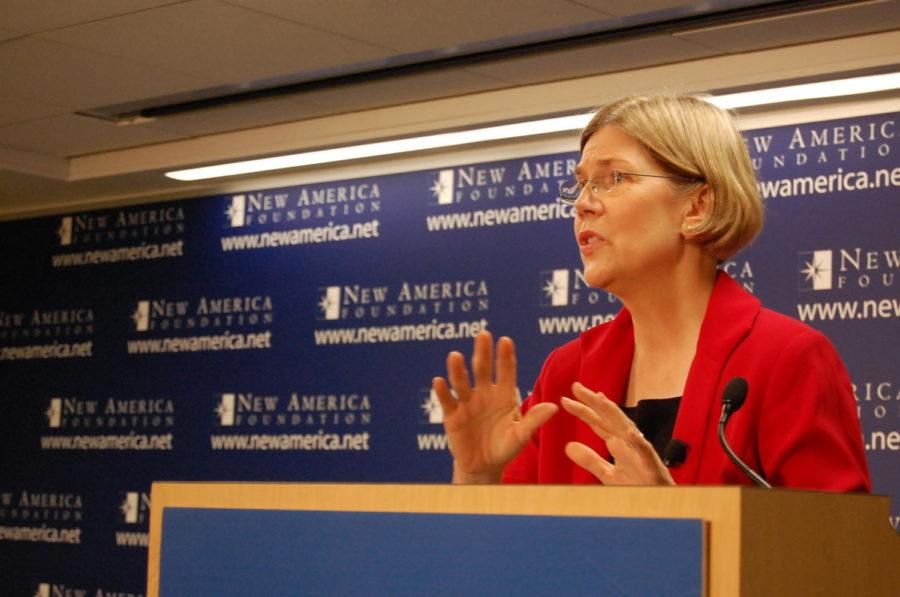Warren unveils proposal for debt cancellation, free tuition
April 22, 2019
As Iowa State faces a trend of rising tuition costs and an unknown tuition price for the upcoming academic year, one Democratic presidential candidate has unveiled a policy to alleviate financial hardship facing college students.
On Monday morning, Sen. Elizabeth Warren announced her plan to cancel most of student loan debt in America and make all technical colleges, two-year and four-year colleges tuition-free.
Warren’s proposal would eliminate up to $50,000 in student debt for people with a household income of less than $100,000, with a $1 decrease in relief for every $3 in income past the $100,000 threshold, up to $250,000.
According to a press release from the Warren campaign, her proposal would “wipe out student loan debt entirely for more than 75 percent of the Americans with that debt” and “substantially increase wealth for Black and Latinx families and reduce both the Black-White and Latinx-White wealth gaps.”
For Warren, however, these aren’t just numbers.
“This is personal for me,” Warren said. “I dropped out of school at 19 to get married, and I got my second chance to get an education by going to a commuter college that cost $50 a semester. I went to a college that I could pay for on a part-time waitressing gig.
“Because of that second chance, I got to become a public school teacher for kids with special needs, a law professor and now a candidate for president. That chance doesn’t exist right now, and I’m in a spot to create opportunity for all our kids.”
The proposal would also expand the Pell Grant, create a $50 billion fund for historically black colleges and minority-serving institutions, bar for-profit colleges from receiving federal money and create an annual audit to examine how public institutions are serving low-income and minority students.
The policy proposal comes amid a campaign season where support for policies such as tuition-free higher education, Medicare for All and a Green New Deal have become more mainstream than in past elections.
A CNN analysis of 2020 candidates’ congressional voting records placed the candidates on a spectrum from zero to 100, with zero being the “most liberal.” The average score for 2020 candidates was 51, with Warren scoring a 27. The past three Democratic nominees averaged a 65 on the scale.
Other candidates, such as Andrew Yang, have released similar proposals in support of eliminating economic barriers to higher education.
Mack Shelley, chair of Iowa State’s Political Science Department, said policies such as these, often termed “socialist” by pundits, can struggle to become mainstream, but once implemented, they become mainstays of American politics.
“The bottom line is these policies people call as being socialist in nature often become so embedded in the American system after implementation that they become exceedingly popular and hard to reverse,” Shelley said. “This is why many Democrats are gaining popularity from this whole ‘Medicare for All,’ because it is a proven success. Does it cost money? Sure. It also does things like provide older adults with substantial income so they don’t become mired in poverty at an older age … that is not so different from the argument of having debt-free students.”
Warren’s proposal is intended to be funded by her “Ultra-Millionaire Tax,” which would tax wealth greater than $50 million at 2 percent and wealth above $1 billion at 1 percent.
Bharat Ramamurti, a policy aide for the Warren campaign, said “experts who have looked at” the policy estimated the tax would bring in about $2.75 trillion throughout the next 10 years by taxing wealth rather than only new income.
“Right now, if you think about it, the way our federal tax system works for individuals, is people are taxed on their income,” Ramamurti said. “If you make $50,000 in a year, you get taxed a certain percentage of that income, but the flaw with that approach is that for people who are already very, very wealthy, there’s no tax on their accumulated wealth.”
However, some have questioned the feasibility of such a policy.
Peter Orazem, a professor in economics at Iowa State, said he doesn’t believe taxing 75,000 people, the only Americans in a high enough income bracket to be affected by the tax, could generate enough revenue to pay for Warren’s proposal.
“I think she’s going to have to come up with other places to find money,” Orazem said.
Others in higher education, such as Randi Weingarten, president of the American Federation of Teachers, have voiced support for Warren’s plan.
“Sen. Warren’s plan would release Americans from their debt sentence so they can live their lives, care for their families and have a fair shot at the American dream,” Weingarten said in a statement. “Not only would it wipe out student debt for most Americans, it would do so automatically and immediately, so people wouldn’t have to worry about being approved or dealing with confusing paperwork.”
Editor’s note: Reporting contributed by Devyn Leeson.

















